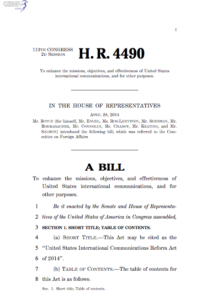BBG Watch Commentary
 A report in The Hill, which focuses on a bipartisan bill to reform U.S. international media outreach managed by the federal bureaucracy of the Broadcasting Board of Governors (BBG), quotes a supporter of reform as saying that fears of U.S. government propaganda are unfounded, but fears The article by Julian Hattem, “VOA reform push sparks propaganda fears,” quotes Ted Lipien, former Voice of America associate director and president of Free Media Online, an NGO which supports the publication of BBG Watch. Ted Lipien is also director at the Committee for U.S. International Broadcasting (CUSIB – cusib.org), another independent NGO which supports BBG journalists who provide uncensored news to countries without free media.
A report in The Hill, which focuses on a bipartisan bill to reform U.S. international media outreach managed by the federal bureaucracy of the Broadcasting Board of Governors (BBG), quotes a supporter of reform as saying that fears of U.S. government propaganda are unfounded, but fears The article by Julian Hattem, “VOA reform push sparks propaganda fears,” quotes Ted Lipien, former Voice of America associate director and president of Free Media Online, an NGO which supports the publication of BBG Watch. Ted Lipien is also director at the Committee for U.S. International Broadcasting (CUSIB – cusib.org), another independent NGO which supports BBG journalists who provide uncensored news to countries without free media.
In recent years, Voice of America had turned to “fluff journalism,” said Ted Lipien, a former acting associate director at the broadcaster.
He said it had ignored the U.S.’s perspective on a slew of important issues and instead turned to content like a recent video clip about zombies, which “allowed them to place their programs on local stations and countries that otherwise would object to serious news or news at all.”
“As a journalist and a former VOA manager and executive, I’m glad that this bill has been introduced and I’m hoping that it will reform Voice of America,” he told The Hill. “I’m not worried that it is going to limit [the] journalistic independence of the Voice of America.”
Instead, he said, the bill “addresses a much larger problem of mismanagement at the organization.”
READ MORE: VOA reform push sparks propaganda fears, Julian Hattem, The Hill, May 4, 2014.
Lipien points out in the article and in other online comments that those who support U.S. international media outreach should not fear not the bipartisan reform bill, which was introduced, but should fear the bureaucracy which runs U.S. international broadcasting and should also fear mismanagement at the Voice of America. The bipartisan bill, introduced by U.S. Rep. Ed Royce (R-CA), Chairman of the House Foreign Relations Committee, and U.S. Rep. Eliot Engel (D-NY), its Ranking Democratic Member, was unanimously adopted by the House Foreign Affairs Committee last week for consideration by the full House and the Senate, HR 4490, The United States International Communications Reform Act.
“This bill does not even go as far as USIA’s public diplomacy (the United States Information Agency), under which the Voice of America (VOA) operated independently quite well in later years with the VOA Charter in place,” Lipien said. “The Charter is included in the new bill. Those who cry propaganda do not know what propaganda is and do not know Putin’s Russia and communist-ruled China. The greatest danger to U.S. international media outreach is the current federal government bureaucracy and the administrative set-up, which the bill attempts to reform. While not perfect, the bill is the best we could get,” Lipien said.
“As long as VOA Charter is observed, VOA will not be forced to do propaganda, but the bill might actually force it to observe the Charter. Of course, there are those that think that the VOA Charter is already introducing propaganda by requiring VOA to report on US policies and discussions about these policies and also to cover American society in its entirety. This is, however, what US taxpayers expect from a public institution. I’m OK with the VOA Charter and hope that it will protect VOA’s journalistic independence, but I would not mind seeing amendments to the bill to make it quite clear,” Lipien added. “Those who say that VOA could become like Russia’s RT or China’s CCTV have little knowledge of Russian and Chinese regimes and their propaganda, and little faith in America’s legislative tradition and commitment to freedom. I also take the Ranking Member of the House Committee on Foreign Affairs, Rep. Eliot Engel, at his word when he says:’
Lastly, and perhaps most importantly, this bill maintains the requirement that U.S.-funded programming serve as objective sources of news and information, and not simply as a mouthpiece for U.S. foreign policy. It’s absolutely critical that the news be accurate and seen as credible by the foreign audiences we’re trying to reach.‘”
ALSO READ: Voice of America wasted estimated millions on improper contract payments, Radio Free Asia gets clean bill of health , BBG Watch, May 3, 2014.
A bipartisan bill, introduced by U.S. Rep. Ed Royce (R-CA), Chairman of the House Foreign Relations Committee, and U.S. Rep. Eliot Engel (D-NY), its Ranking Democratic Member, and unanimously adopted by the House Foreign Affairs Committee last week for consideration by the full House and the Senate, HR 4490, The United States International Communications Reform Act, states:
“(11) According to the Office of the Inspector General, the BBG’s Office of Contracts is not in compliance with the Federal Acquisition Regulation, lacks appropriate contract oversight, and violates the Anti-Deficiency Act. The Office of the Inspector General also determined that the Broadcasting Board of Governors has not adequately performed full and open competitions or price determinations, has entered into hundreds of personal service con- tracts without statutory authority, and contractors regularly work without valid contracts in place.
(12) The size and make-up of the BBG work- force should be closely examined, given the agency’s broader broadcasting and technical mission, as well as changing media technologies.
(13) The BBG should be structured to ensure that more taxpayer dollars are dedicated to the sub- stantive, broadcasting, and information-related elements of the agency’s mission.
(14) The lack of a coherent and well defined mission of the Voice of America has led to program- ming that duplicates the efforts of the Office of Cuba Broadcasting, Radio Free Asia, RFE/RL, Incorporated, and the Middle East Broadcasting Net- work that results in inefficient use of tax-payer funding.
(15) The annual survey conducted by the ‘‘Partnership for Public Service’’ consistently ranks the Broadcasting Board of Governors at or near the bottom of all Federal agencies in terms of ‘‘overall best places to work’’ and ‘‘the extent to which employees feel their skills and talents are used effec- tively.’’. The consistency of these low scores point to structural, cultural, and functional problems at the Broadcasting Board of Governors.”

